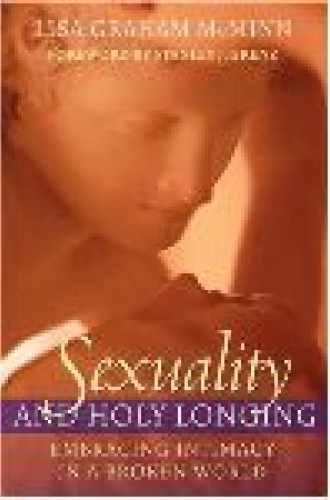Sexuality and Holy Longing: Embracing Intimacy in a Broken World
Lisa Graham McMinn explores hot-button topics like abortion, homosexuality, masturbation, pornography and other sexual issues in her book. Her premise is that all sexuality is a function of our drive toward intimacy with God and with others. As sin has damaged the rest of the world, so has it damaged sexuality. Thus our longing for intimacy can never be completely fulfilled on earth. Sexual frustration and brokenness will remain both within marriage and without. Only when we realize that true fulfillment can be found only in heaven, McMinn argues, can we reclaim a healthy sexuality.
McMinn incorporates many different elements into her book: anonymous narratives (some from students in her theology of sexuality class at Wheaton College), sociological studies, stories from her own experience and theological criticism. This mishmash of sources is often frustrating. Biblical accounts of sexuality are passed over in favor of delicate protests about the assumptions of the evangelical subculture (the Song of Solomon, for instance, is not mentioned until near the end of the book, where McMinn debunks marital myth No. 3, “Good Women Do Not Enjoy Sex”). And thoroughgoing sociological analysis is neglected for vignettes from the lives of ordinary people, vignettes which often skew her conclusions. (Of the four homosexuals McMinn quotes, none are content with their sexual orientation, even though she states that sexual orientation of any sort could come from God.)
Overall, McMinn makes an excellent and necessary point. In our culture sexuality is too often divorced from intimacy. Hollywood presents romantic love and sex as almost the only source of relational fulfillment. When romance and sex elude people, they are left without any hope for fulfillment. Thus the value of McMinn’s emphasis on intimacy. Seeing connection with other people as our central drive can help us better navigate the trials of childhood, adolescence, childbirth and menopause.
Some of the book’s arguments have been rehashed too many times. Is it really necessary, at this point, to be told that both singles and marrieds are intended by God to have equally fulfilling lives? That women enjoy sex too? That marriage cannot be counted on to completely fulfill either man or woman? McMinn is at her best when she is exploring problems only tangentially related to sexuality, such as the relationship of sexual brokenness to the epidemic of female eating disorders in this country, or how false masculine ideals leave men as damaged sexually as women are.





